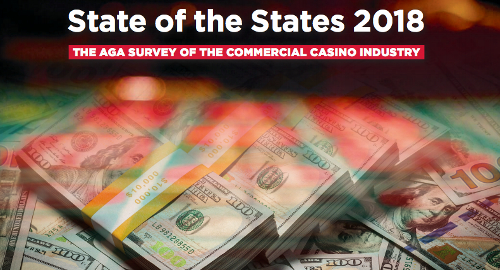 America’s commercial casino gaming revenue topped $40b in 2017, with five-sixths of US casino states reporting year-on-year revenue gains.
America’s commercial casino gaming revenue topped $40b in 2017, with five-sixths of US casino states reporting year-on-year revenue gains.
On Wednesday, the American Gaming Association (AGA) released its annual State of the States report, which showed non-tribal casino gaming revenue hitting $40.3b in 2017, up 3.4% from 2016. State governments’ share of this bounty improved 3.1% to $9.2b.
The number of casinos surveyed fell from 515 in 2016 to 460 last year due to “a rigorous effort to accurately and consistently identify individual gaming properties.” Nevada was responsible for the bulk of the decline under this new metric, with its casino count falling from 273 to 215.
Of the 24 states with commercial casinos, 20 reported year-on-year gaming revenue gains. Twelve states set new revenue records, with the largest increase (34.6%) coming in Maryland, thanks to the late-2016 opening of MGM Resorts’ new National Harbor venue.
Of the four states that suffered revenue declines, West Virginia led the pack with a 4.6% fall, also thanks to MGM’s National Harbor, which siphoned off customers close to the Maryland border.
In terms of market revenue, Nevada predictably led all comers with just under $11.6b (+2.8%), with Pennsylvania well back at $3.2b (+0.4%) and New Jersey third with $2.66b (+2.1%). New York ($2.35b, +16.4%) and Indiana ($2.2b, +1.1%) rounded out the top-five.
Only 15 states separately report slot machine and table game revenue, and these states collectively reported table revenue gaining 5.8% year-on-year while slots eked out a mere 1.8% rise, continuing a multi-year trend.
Supplementary data from Oxford Economics indicated that the US commercial casino industry directly employed over 361k individuals, who collectively drew $17.4b in wages, benefits and tips last year.
Having had a change of heart regarding legal sports betting a few years back, the AGA’s report hammered home the need for policymakers to ensure that betting legislation allows state-approved sportsbooks to offer a product “attractive enough to draw bettors away” from internationally licensed betting sites. The AGA singled out Pennsylvania’s looney-tunes 36% tax on betting revenue as a cautionary tale.
Tellingly, while the AGA’s survey notes the four states that have approved online gambling, there is no dedicated section to the vertical. The AGA has been slowly adding online-only members to its land-based roster, but old habits die hard.
This online skittishness likely reflects the AGA’s ongoing reluctance to piss off Sheldon Adelson, the Las Vegas Sands honcho who threatened to pull his funding of the AGA if it lobbied for online legislation, a threat that forced the AGA to backtrack on its tentative embrace of digital gambling.